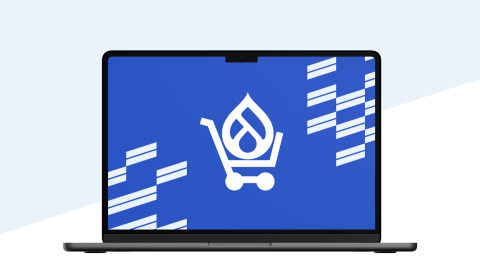There are many Drupal 9 distributions to help you build complex and beautiful websites in the short term. You can use a Drupal project management distribution, distributions for education, content management, and other distributions with versatile functionality.
In this article, we present a Drupal distributions compilation for 2025 — a comprehensive guide on your options while starting a new Drupal-based project. Learn the top choices and their core characteristics.
What is a Drupal distribution?
A Drupal distribution is a collection of software components that simplifies creating and configuring websites, such as landing pages, social networks, and e-commerce platformsю
In essence, Drupal distributions consist of the Drupal core topped with various modules, libraries, themes, configs, and other elements vital to building a website.
Types of Drupal distributions
Basically, there are two main types of Drupal distributions - public and private distributions. Let's figure out the cases where each can be used:
- Open-source distributions — public distributions that can be used as templates for various projects.
- Private distributions — made to work for the requirements of a particular company; private distributions are not published and are accessible only by one organization.
Read the post about a Fieldable Drupal Menu to build complex website menus with Drupal 9.
Why use Drupal distributions for web development
Drupal distributions provide the opportunity to start project development quicker and get a range of ready-made features that cover the basic software requirements.
Drupal distributions give developers simplicity, efficiency, and many other benefits:
- Set up easily. A full-featured Drupal distribution offers a pre-configured package. Unwrap it, and you will receive a functional product in hours.
- Everything you might need out of the box. Drupal distributions contain everything you need to set up a website that will work perfectly for your industry. This saves the time you spend downloading modules and packages necessary for a more conventional custom Drupal setup.
- Easier maintenance. Because distributions are collections of elements, you can update everything within them in one sitting. Put differently, instead of updating many separate packages, you can edit a single distribution and be good to go.
Now that we know what Drupal distributions are and how you benefit from them let’s look at the industry-specific distributions the Drupal community offers. We selected only Drupal 9 distributions with a recent update and active usage within the community.
Drupal distributions considerations
Drupal distribution usage can save time and money, but you must consider its limitations. Each distribution has its unique architecture. Therefore, if you plan on a scalable solution, you might face some architectural limitations. You can still use the starter kit distributions or parts of those. They include general modules that decrease the risks of a project planned to scale.
Another pitfall of Drupal distributions is determining how long they will last. With Drupal core updates comes the necessity of keeping distribution components up to date, which might require significant time and money. As a result, certain distributions get updates becoming irrelevant, like Panopoly or Express.
On the other hand, knowing Drupal distributions are open source, you can always pick it up and proceed with maintenance and development to serve your needs and give back to the community.
The Best Drupal Distributions in 2025
Here are the main categories of the Drupal distributions you may need in your web development project.
Starter kits
Starter kits are Drupal distributions for a quick setup of primary website functionality. They are helpful when you are looking to build a customized product with Drupal and don’t want to experience the limitations of full-featured distributions.
Varbase

Varbase is a functional Drupal distribution for faster and simpler development of content-oriented products. The distribution provides many features and thorough test coverage. The top features are:
- Built-in SEO
- Responsive designs supported across many screen sizes
- Straightforward drag-and-drop content and media management
- Customizable admin interface
Drupal content distribution
You'll need Drupal content distribution to build a content-driven product. Content management systems (CMS) allow for the simple creation and management of different types of content.
EzContent

EzContent is full-featured content management distribution that provides a broad range of content publishing features. It simplifies content creation and distribution with real-time SEO page optimization, a vast component library, and AI-generated content operated by Srijan AI services and Amazon Rekognition.
Thunder

Thunder is another widespread Drupal 9-compatible distribution. It provides various features for convenient content management and some community-created extensions that the original developers of Thunder use to enhance the solution further.
The set of features and benefits provided by Thunder includes:
- Dynamic and comfortable content and media management with a WYSIWYG editor
- Content scheduling
- Real-time blogging
- Mobile-friendly layout
- Integration of Google AMP
- Great community
Open Y

Open Y is a content management system (CMS) that leverages the functionality of Drupal 9 and integrates modules from YMCAs and their partners. Open Y is entirely free of charge, and its developers welcome anyone willing to contribute to developing this platform.
Vardoc

Vardoc is a documentation-oriented Drupal distribution built with Varbase. Vardoc aims at simplifying the creation, structuring, and maintenance of content-rich products, such as product manuals or documentation and information portals for organizations.
Web Experience Toolkit

Web Experience Toolkit (WxT) is a Drupal-based CMS for simply creating and maintaining content-driven products. WxT is open-source and maintained by the Government of Canada.
Online communities
Developing online community-based products takes work. Drupal distributions can make it simple and fast.
Open Social

Open Social is a Drupal distribution that allows developers to build online communities out of the box. Open Social proves itself as an excellent solution for digital agencies and web developers due to the variety of features available, including:
- User account and profile management
- Content management and creation
- User collaboration
- Activity streams and notifications
- Standard social media features
- Control over user privacy
- Simple platform configuration
- Enhanced performance
- GDPR compliance
Open Social is one of the most popular Drupal 9 distributions, and the Lemberg Solutions team actively contributes to and improves it regularly. If you want to learn about the recent products we developed with Open Social, visit our portfolio.
Drupal education distributions
Educational platform development can be a hassle as developers have to figure out the implementation of many organizational and management aspects from scratch. A well-selected Drupal distribution can cut the development in two, reducing routine processes and leaving only the fun customization part.
Opigno LMS

Opigno LMS is a full-featured Drupal learning management system. It provides a quick and easy way to start with the Opigno e-learning framework, offering innovative instruments for building functional e-learning platforms. With Opigno LMS, you can:
- Manage training programs based on lessons and courses
- Assess student performance with a variety of quizzes
- Grant awards and certificates to successful students
- Sell courses online
- Hold live meetings, chats, and forums.
Drupal distributions for businesses and non-profit organizations
The capabilities of various Drupal distributions truly shine when building organization-specific products. Because of this, there are many Drupal 9-compatible distributions to serve the needs of different businesses, corporations, and nonprofits.
Droopler

Droopler is a Drupal distribution that offers a pre-configured website out of the box, which you can further customize to fit your business needs. It leverages a custom Bootstrap 4 theme, modular page constructor, and multilingual support.
Droopler is excellent for:
- Business and corporate websites — every company needs a website, but only some have a considerable budget. Droopler is a perfect start to building beautiful, professional websites on a budget.
- Website factories — when you have to build multiple microsites, also giving your editors advanced content editing features. You can easily adjust available themes to match your brand colors and launch multiple branded websites fast.
- E-commerce — If you want to start a Drupal Commerce distribution project, Droopler will let you do that much faster with the ability to have a fully working website in minutes.
Cloud Orchestrator

Cloud Orchestrator is a Drupal distribution for practical Amazon EC2, Kubernetes, and OpenStack resource management. In particular, it optimizes the management of connections and interactions within a public and private cloud infrastructure.
Visual Distribution Operator (VDO)

Visual Distribution Operator (VDO) deals with management base code development. It helps developers to manage the base code development work cycle for custom distributions.
Build Drupal projects with Lemberg Solutions
There is a significant variety of Drupal distributions, but their selection and application will be challenging for you as withing technical consultants. Based on our Drupal development projects, having a team of professionals for the more complex projects is always better.
With 15+ years of professional experience, Lemberg Solutions can offer Drupal development services of more than 40 professional developers to develop a highly functional product according to your business needs.

FAQs
What are the top Drupal distributions in 2025?
Among the new Drupal distributions, we want to mention EzContent, which provides extensive content publishing functions, a Cloud orchestrator accountable for managing cloud infrastructure, etc.
What to use Drupal distributions for?
Drupal distributions are starter kits to develop a platform with basic functionality. It is a quick and easy shortcut. However, it suits projects that don't plan to scale, as the architecture of Drupal distributions has limitations.
When not to use Drupal distributions?
If a project is large and plans to grow in the future, Drupal distributions show low efficiency. Indeed, you can use starter kits to launch the basic functionality, but integrating new modules and functions will be problematic. Moreover, you may need to re-write the code of the entire product to scale it properly.




